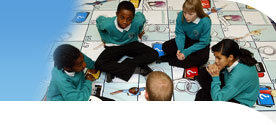



The contribution citizenship makes to pupils' enjoyment stems from the opportunities it gives them to participate actively in public life. Pupils are motivated to take part in debate, and find out about and take action on real political and social issues. They are confident to discuss and explore their ideas and views about controversial local and global issues.
Pupils appreciate the opportunities it gives them to use a wide range of knowledge and skills. For example, when they express themselves on topical issues and problems they might present their ideas and opinions to persuade others, or create, plan and take part in different forms of action to try to make a difference in their communities.
Pupils enjoy being able to tackle real and topical issues of concern to them or those they represent, and to participate in decision-making. They relish the opportunities to work with others, make decisions and take responsibility.
Pupils value the ways in which citizenship helps them achieve, in the subject, across the curriculum and in the world beyond, by developing their ability to communicate effectively and participate collectively as valued members of society.
Central to citizenship is recognising the importance of each individual's views and actions. By encouraging pupils to be open about their own ideas and worries, and respectful of views that are different to their own, citizenship provides a means for pupils to voice concerns and do something constructive about them.
Participation increases pupils' sense of well-being and gives them a sense of purpose. They feel empowered to try to change things or make decisions for the common good. The celebration of all types of participation is important to ensure that pupils feel their contribution is valued and appreciated, even when the outcome is not as successful as intended.
Citizenship provides opportunities for pupils to learn about the politics of public health and the role of the National Health Service. For example, they may investigate how local spending decisions affect resources in their community; whether decisions about treatment availability are fair and equitable across the nation; or cases where actions taken by groups or individuals lead to policy change that benefits others. Developing knowledge and understanding of these kinds of issues helps them to make informed and responsible decisions about health.
Citizenship gives pupils the confidence to ask questions, rather than taking things at face value. Through researching a wide range of political and social problems, pupils develop the skills to evaluate the validity of what they are told, develop informed opinions and make responsible decisions to stay safe. Citizenship equips them with the skills to evaluate the validity of what they are told, develop informed opinions and make responsible decisions to stay safe.
Pupils engage in debates on topical controversial issues and learn rules for responsible and sensitive participation in such debates.
Citizenship can provide opportunities to explore situations and dilemmas in relation to safety. For example, when learning about crime and the criminal justice system, pupils explore the consequences of different courses of action and the impact on individuals, communities, society and the environment.
Pupils are given opportunities to work in a range of situations where there are difficult choices to make, perhaps where rights and responsibilities compete or conflict, or there are risks of harm or discrimination. They become practised in using skills to weigh up evidence and make informed decisions. They learn how to seek appropriate help and advice, and how to reduce risks for themselves and for others when working in the wider community.
Citizenship plays a central role in contributing to young people's long-term economic well-being by developing skills and attributes essential to any job. It encourages them to ask questions, be resourceful and enterprising in order to find creative solutions to problems, plan and prepare to put their views and ideas across for maximum effect, negotiate and have influence on others, take real action, make decisions and evaluate the impact of these, and work effectively and cooperatively in groups and teams. All these skills and attributes are valued by employers.
Citizenship provides opportunities for pupils to learn about the economic dimensions of political and social decisions and the impact of these on individuals and communities locally and nationally, as well as in Europe and the wider world. Pupils explore the kinds of difficult choices that governments (local and national) take about taxation and public spending, and how to ensure value for money.
They learn about the law in relation to employer, employee and consumer rights and responsibilities in different situations, and the impact of spending choices on individuals, groups and communities, including the global community.
Citizenship equips pupils to play an active, informed and critical role in public life as responsible citizens. It provides many opportunities to get involved and contribute positively to real issues and problems facing individuals and communities by working collaboratively with others to try to have influence, make change or resist unwanted change.
Through different forms of individual and collective action, pupils experience and develop the knowledge, skills, confidence and conviction to participate effectively, responsibly and democratically in society. Citizenship helps them learn about ways in which individuals, groups and organisations can influence decision-making through action. They develop skills of critical thinking, informed action, advocacy and representation. Moreover, they learn to appreciate the value of evaluation and reflection when considering the impact of their actions and the actions of others, which motivates them to try to improve things for the common good.